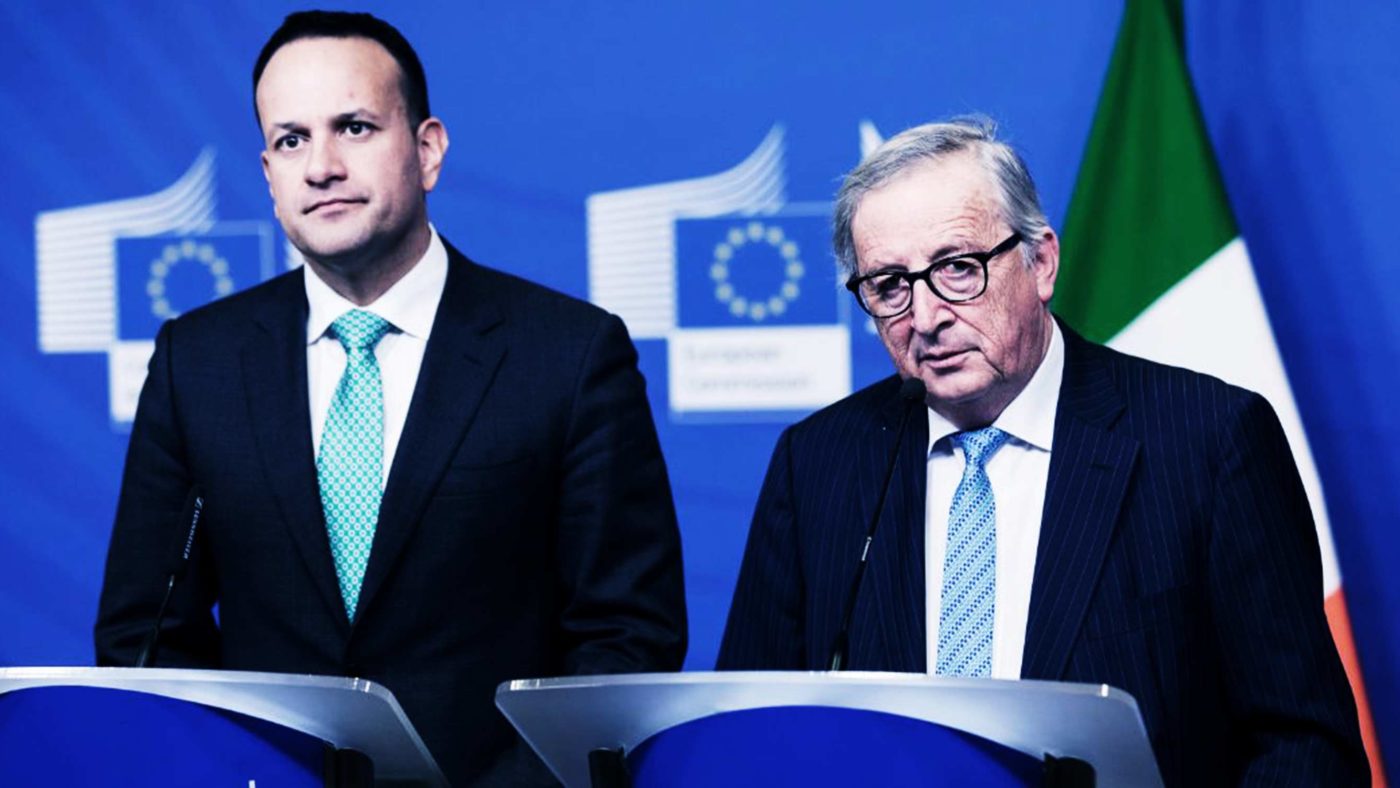In Dublin, there is rising panic that Boris Johnson means what he says about the Irish backstop.
The Republic’s prime minister, Leo Varadkar, blustered that ‘no deal’ may lead to a ‘united Ireland’, but he knows that his government’s aggressive position on Brexit helped to bring Boris Johnson to power and could, ultimately, destroy his country’s economy.
If that happens, it will be a shame for the Irish people, but Leo Varadkar will deserve everything he gets.
He could have encouraged Brussels to deal constructively with Westminster – to protect trade between the Republic and the UK and ease tensions in Northern Ireland. Instead, he chose to go along with the EU’s plan to punish Britain for its decision to leave, in the knowledge that old-fashioned Brit-bashing would boost his popularity at home.
Theresa May capitulated to Varadkar, agreeing to an internal UK border down the Irish Sea, to which she’d previously claimed no British prime minister could ever agree. Partly, this was because she intended to use the backstop as a ‘bridge’ to a more permanent customs arrangement with the EU. Britain’s chief negotiator, Olly Robbins, was overheard explaining this strategy in a Brussels’ bar, a strategy that showed remarkable weakness in the face of Irish nationalist hostility to the UK’s right to take a decision over the future of the whole of its territory.
Boris Johnson, it should be remembered, eventually voted for May’s draft withdrawal agreement. Now he seems prepared at least to test the EU’s determination by demanding the removal of the backstop, as a condition for restarting negotiations. It’s extraordinary that rejecting this scheme to partition the UK is portrayed as a hardline position.
As he visits Belfast today, Johnson must start to challenge some of the nonsense that Varadkar and his virulently nationalist deputy, Simon Coveney, have spread about Brexit, the border and Northern Ireland. Successive administrations at Westminster refused to contradict Dublin’s deeply partial pronouncements about Ulster and this tendency has become pathological since the Brexit referendum result.
In a paper about the backstop, the historian, Lord Bew, expressed astonishment at “the way in which the British government has allowed the Irish government to control the narrative around the Good Friday Agreement unchallenged”. Theresa May effectively accepted the invented notion that new infrastructure at the border would breach the terms of the peace accord. Consistently, Irish nationalists’ psychological need to pretend that the border between the Republic of Ireland and Northern Ireland doesn’t exist has been prioritised over unionists’ desire to protect the province’s political and economic links with the rest of the United Kingdom.
If Johnson genuinely believes that “the Union comes first”, then he should take his cue from Lord Trimble, who has argued robustly that it is the backstop that “drives a coach and horses” through the Belfast Agreement. The 1998 deal was based on the ‘principle of consent’, which acknowledges “the present wish of a majority of the people in Northern Ireland, freely exercised and legitimate, is to maintain the Union and, accordingly, that Northern Ireland’s status as part of the United Kingdom reflects and relies upon that wish.”
From unionists’ point of view, and their perspective is backed up by the agreement, the rights and wrongs of Brexit and the complexities of the negotiations are irrelevant to this principle. If you acknowledge, as the Irish government claims to do, that the people of Northern Ireland will decide their constitutional future, then voters here had every right to participate in a nationwide ballot like the EU referendum on the same basis as electors in Great Britain. If the province is treated substantially differently from the rest of the UK as we leave, then its place in the Union and the political rights of its people have been infringed.
During the Conservative leadership campaign and his short premiership, Boris Johnson has returned to the position that Britain cannot hand over control over part of its territory to the European Union. He recognises that hiving off a UK region behind an economic border, requiring companies to fill in customs declarations to ship goods to part of their own country, potentially allowing major differences to arise in regulation, are drastic measures designed to humiliate the British government and curtail its power in Northern Ireland.
There are other distortions too that need to be refuted strongly. For example, the backstop was not, as Dublin and the EU claim, included in the withdrawal agreement at the UK’s insistence. Brussels pursued a ‘special status’ for Northern Ireland early in negotiations and, with a few cosmetic tweaks, this scheme was included in the deal it agreed with Theresa May.
Her negotiators presented the protocol as a ‘UK wide’ backstop but that was misleading. Many of its features applied only to Northern Ireland and, in any case, the UK was trying to mitigate a demand that came originally from the EU and the Republic of Ireland.
At the back of their minds, Ulster unionists will worry that, if Mr Johnson feels he can deliver a deal and limit the backstop to Northern Ireland, then he will sacrifice the province to secure Brexit. Currently though, he is showing some of the resolve that you would expect from any British prime minister in the face of a shameless challenge to the UK’s territorial integrity.
If he remains steadfast, then he may yet deserve his title as self-appointed ‘Minister for the Union’.
CapX depends on the generosity of its readers. If you value what we do, please consider making a donation.


